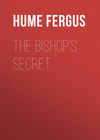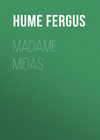Czytaj książkę: «The Opal Serpent», strona 6
Hurd listened attentively. "Oh," said he, with a world of meaning, "so Mr. Grexon Hay was with you? Hum! Do you suppose he pushed you into the road on purpose?"
"No," said Paul, staring, "I'm sure he didn't. What had he to gain by acting in such a way?"
"Money, you may be sure," said Hurd. "That gentleman never does anything without the hope of a substantial reward. Hush! We'll talk of this when you're better, Mr. Beecot. You say the brooch was lost."
"Yes. It must have slipped out of my pocket when I fell under the wheels of that machine. I believe there were a number of loafers and ragged creatures about, so it is just possible I may hear it has been picked up. I've sent an advertisement to the papers."
Hurd shook his head. "You won't hear," he said. "How can you expect to when you know the brooch was used to seal the dead man's lips?"
"I forgot that," said Paul, faintly. "My memory – "
"Is not so good as it was." Hurd rose. "I'll go, as I see you are exhausted. Good-bye."
"Wait! You'll keep me advised of how the case goes?"
"Certainly, if the doctors will allow me to. Good-bye," and Hurd went away very well satisfied with the information he had obtained.
The clue, as he thought it was, led him to Wargrove, where he obtained useful information from Mr. Beecot, who gave it with a very bad grace, and offered remarks about his son's being mixed up in the case, which made Hurd, who had taken a fancy to the young fellow, protest. From Wargrove, Hurd went to Stowley, in Buckinghamshire, and interviewed the pawnbroker whose assistant had wrongfully sold the brooch to Beecot many years before. There he learned a fact which sent him back to Mr. Jabez Pash in London.
"I says, sir," said Hurd, when again in the lawyer's private room, "that nautical gentleman of yours pawned that opal serpent twenty years ago more or less."
"Never," said the monkey, screwing up his face and chewing.
"Yes, indeed. The pawnbroker is an old man, but he remembers the customer quite well, and his description, allowing for the time that has elapsed, answers to the man who tried to get the jewels from you."
Mr. Pash chewed meditatively, and then inflated his cheeks. "Pooh," he said, "twenty years is a long time. A man then, and a man now, would be quite different."
"Some people never change," said Hurd, quietly. "You have not changed much, I suspect."
"No," cackled the lawyer, rather amused. "I grew old young, and have never altered my looks."
"Well, this nautical gentleman may be the same. He pawned the article under the name of David Green – a feigned one, I suspect."
"Then you think he is guilty?"
"I have to prove that the brooch came into his possession again before I can do that," said Hurd, grimly. "And, as the brooch was lost in the street by Mr. Beecot, I don't see what I can do. However, it is strange that a man connected with the pawning of the brooch so many years ago should suddenly start up again when the brooch is used in connection with a terrible crime."
"It is strange. I congratulate you on having this case, Mr. Hurd. It is an interesting one to look into."
"And a mighty difficult one," said Hurd, rather depressed. "I really don't see my way. I have got together all the evidence I can, but I fear the verdict at the inquest will be wilful murder against some person or persons unknown."
Hurd, who was not blind to his own limitations like some detectives, proved to be a true prophet. The inquest was attended by a crowd of people, who might as well have stayed away for all they learned concerning the identity of the assassin. It was proved by the evidence of Sylvia and Deborah how the murder had taken place, but it was impossible to show who had strangled the man. It was presumed that the assassin or assassins had escaped when Deborah went upstairs to shout murder out of the first-floor window. By that time the policeman on the Gwynne Street beat was not in sight, and it would have been easy for those concerned in the crime – if more than one – to escape by the cellar door, through the passage and up the street to mingle with the people in the Strand, which, even at that late hour, would not be deserted. Or else the assassin or assassins might have got into Drury Lane and have proceeded towards Oxford Street. But in whatever direction they went, none of the numerous policemen around the neighborhood on that fatal night had "spotted" any suspicious persons. It was generally assumed, from the peculiar circumstances of the crime, that more than one person was inculpated, and these had come out of the night, had committed the cruel deed, and then had vanished into the night, leaving no trace behind. The appearance of the fellow whom Mr. Pash called the nautical gentleman certainly was strange, and led many people to believe that robbery was the motive for the commission of the crime. "This man, who was powerful and could easily have overpowered a little creature like Norman, came to rob," said these wiseacres. "Finding that the jewels were gone, and probably from a memorandum finding that they were in the possession of the lawyer, he attempted the next morning to get them – " and so on. But against this was placed by other people the cruel circumstances of the crime. No mere robbery would justify the brooch being used to pin the dead man's lips together. Then, again, the man being strangled before his daughter's eyes was a refinement of cruelty which removed the case from a mere desire on the part of the murdered to get money. Finally, one man, as the police thought, could not have carried out the abominable details alone.
So after questions had been asked and evidence obtained, and details shifted, and theories raised, and pros and cons discussed, the jury was obliged to bring in the verdict predicted by Mr. Hurd. "Wilful murder against some person or persons unknown," said the jury, and everyone agreed that this was the only conclusion that could be arrived at.
Of course the papers took up the matter and asked what the police were doing to permit so brutal a murder to take place in a crowded neighborhood and in the metropolis of the world. "What was civilisation coming to and – " etc., etc. All the same the public was satisfied that the police and jury had done their duty. So the inquest was held, the verdict was given, and then the remains of Aaron Norman were committed to the grave; and from the journals everyone knew that the daughter left behind was a great heiress. "A million of money," said the Press, and lied as usual.
CHAPTER IX
CASTLES IN THE AIR
So Aaron Norman, the second-hand bookseller of Gwynne Street, was dead and buried, and, it may be said, forgotten. Sylvia and those connected with her remembered the old man and his unhappy end, but the public managed to forget all about the matter in a wonderfully short space of time. Other events took place, which interested the readers of the newspapers more, and few recalled the strange Gwynne Street crime. Many people, when they did think, said that the assassins would never be discovered, but in this they were wrong. If money could hunt down the person or persons who had so cruelly murdered Aaron Norman, his daughter and heiress was determined that money could not be better spent. And Billy Hurd, knowing all about the case and taking a profound interest in it by reason of the mystery which environed it, was selected to follow up what clues there were.
But while London was still seething with the tragedy and strangeness of the crime, Mr. Jabez Pash came to the heterogeneously-furnished sitting-room in Gwynne Street to read the will. For there was a will after all. Deborah, and Bart, who had witnessed it at the request of their master, told Mr. Pash of its existence, and he found it in one of the three safes in the cellar. It proved to be a short, curt document, such as no man in his senses would think of making when disposing of five thousand a year. Aaron was a clever business man, and Pash was professionally disgusted that he had left behind him such a loose testament.
"Why didn't he come to me and have it properly drawn up?" he asked as he stood in the cellar before the open safe with the scrap of paper in his hand.
Deborah, standing near, with her hands on her haunches, laughed heartily. "I think master believed he's spent enough money with you, sir. Lor' bless you, Mr. Pash, so long as the will's tight and fair what do it matter? Don't tell me as there's anything wrong and that my pretty won't come into her forting?"
"Oh, the will's right enough," said Pash, screwing up his cheeks; "let us go up to the sitting-room. Is Miss Sylvia there?"
"That she are, sir, and a-getting back her pretty color with Mr. Paul."
Pash looked suspiciously at the handmaiden. "Who is he?"
"Nobody to be spoke of in that lump of dirt way," retorted Deborah. "He's a gentleman who's going to marry my pretty."
"Oh, the one who had the accident! I met him, but forgot his name."
Miss Junk nodded vigorously. "And a mercy it was that he wasn't smashed to splinters, with spiled looks and half his limbses orf," she said. "Why, bless you, Mr. Pash, could I let my sunbeam marry a man as wasn't all there, 'eart of gold though he may have? But the blessing of Providence kept him together," shouted Deborah in a burst of gratitude, "and there he sits upstairs with arms to put about my lily-queen for the drying of her dear eyes."
Mr. Pash was not at all pleased at this news and rubbed his nose hard. "If a proper will had only been made," he said aggressively, "a proper guardian might have been appointed, and this young lady would not have been permitted to throw herself away."
"Beggin' your parding, Mr. Pash," said Deborah, in an offended tone, "but this marriage is of my making, to say nothing of Heaven, which brought him and my pretty together. Mr. Beecot ain't got money, but his looks is takin', and his 'eart is all that an angel can want. My pretty's chice," added the maiden, shaking an admonitory finger, "and my pretty's happiness, so don't you go a-spilin' of it."
"I have nothing to say, save to regret that a young lady in possession of five thousand a year should make a hasty contract like this," said Mr. Pash, dryly, and hopping up the cellar stairs.
"It wasn't hasty," cried Deborah, following and talking all the time; "six months have them dears billed and cooed lovely, and if my queen wants to buy a husband, why not? Just you go up and read the will proper and without castin' cold water on my beauty's warm 'eart, or trouble will come of your talkin'. I'm mild," said Deborah, chasing the little lawyer up the stairs leading to the first floor, "mild as flat beer if not roused: but if you make me red, my 'and flies like a windmill, and – "
Mr. Jabez Pash heard no more. He stopped his legal ears and fled into the sitting-room, where he found the lovers seated on a sofa near the window. Sylvia was in Paul's embrace, and her head was on his shoulder. Beecot had his arm in a sling, and looked pale, but his eyes were as bright as ever, and his face shone with happiness. Sylvia also looked happy. To know that she was rich, that Paul was to be her husband, filled the cup of her desires to the brim. Moreover, she was beginning to recover from the shock of her father's death, and was feverishly anxious to escape from Gwynne Street, and from the house where the tragedy had taken place.
"Well," said Mr. Pash, drawing a long breath and sucking in his cheeks, "you lose no time, young gentleman."
Paul laughed, but did not change his position. Sylvia indeed blushed and raised her head, but Paul still held her with his uninjured arm, defying Mr. Pash and all the world. "I am gathering rosebuds while I may, Mr. Pash," said he, misquoting Herrick's charming line.
"You have plucked a very pretty one," grinned the monkey; "but may I request the rosebud's attention?"
Sylvia extricated herself from her lover's arm with a heightened color, and nodded gravely. Seeing it was business, she had to descend from heaven to earth, but she secretly hoped that this dull little lawyer, who was a bachelor and had never loved in his dry little life, would soon go away and leave her alone with Prince Charming. Deborah guessed these thoughts with the instinct of fidelity, and swooped down on her young mistress.
"It's the will, poppet," she whispered loudly, "but if it do make your dear head ache Mr. Beecot will listen."
"I wish Mr. Beecot to listen in any case," said Pash, dryly, "if he is to marry my young and esteemed client."
"We are engaged with the consent of my poor father," said Sylvia, taking Paul's hand. "I shall marry no one but Paul."
"And Paul will marry an angel," said that young man, with a tender squeeze, "although he can't keep her in bread-and-butter."
"Oh, I think there will be plenty of bread-and-butter," said the lawyer. "Miss Norman, we have found the will if," added Mr. Pash, disdainfully, "this," he held out the document with a look of contempt, "can be called a will."
"It's all right, isn't it?" asked Sylvia, anxiously.
"I mean the form and the writing and the paper, young lady. It is a good will in law, and duly signed and witnessed."
"Me and Bart having written our names, lovey," put in Deborah.
Pash frowned her into silence. "The will," he said, looking at the writing, "consists of a few lines. It leaves all the property of the testator to 'my daughter.'"
"Your daughter!" screamed Deborah. "Why, you ain't married."
"I am reading from the will," snapped Pash, coloring, and read again: "I leave all the real and personal property of which I may die possessed of to my daughter."
"Sylvia Norman!" cried Deborah, hugging her darling.
"There you are wrong," corrected Pash, folding up the so-called will, "the name of Sylvia isn't mentioned."
"Does that make any difference?" asked Paul, quietly.
"No. Miss Norman is an only daughter, I believe."
"And an only child," said Deborah, "so that's all right. My pretty, you will have them jewels and five thousand a year."
"Oh, Paul, what a lot of money!" cried Sylvia, appalled. "Whatever will we do with it all?"
"Why, marry and be happy, of course," said Paul, rejoicing not so much on account of the money, although that was acceptable, but because this delightful girl was all his very – very own.
"The question is," said Mr. Pash, who had been reflecting, and now reproduced the will from his pocket, "as to the name?"
"What name?" asked Sylvia, and Deborah echoed the question.
"Your name." Pash addressed the girl direct. "Your father's real name was Krill – Lemuel Krill."
Sylvia looked amazed, Deborah uttered her usual ejaculation, "Lor'!" but Paul's expression did not change. He considered that this was all of a piece with the murder and the mystery of the opal brooch. Undoubtedly Mr. Lemuel Krill, alias Aaron Norman, must have had good reason to change his name and to exhibit terror at the sight of the brooch. And the reason he dreaded, whatever it might be, had been the cause of his mysterious and tragic death. But Paul said nothing of these thoughts and there was silence for a few minutes.
"Lor,'" said Deborah again, "and I never knew. Do he put that name to that, mister?" she asked, pointing to the will.
"Yes! It is signed Lemuel Krill," said Pash. "I wonder you didn't notice it at the moment."
"Why, bless you, Mr. Pash, there weren't no moment," said Deborah, her hands on her hips as usual. "Master made that there will only a short time before he was killed."
Pash nodded. "I note the date," said he, "all in order – quite."
"Master," went on Deborah, looking at Paul, "never got over that there fainting fit you gave him with the serping brooch. And he writes out that will, and tells Bart and me to put our names to it. But he covered up his own name with a bit of red blotting-paper. I never thought but that he hadn't put Aaron Norman, which was his name."
"It was not his name," said Pash. "His real name I have told you, and for years I have known the truth."
"Do you know why he changed his name?" asked Beecot, quickly.
"No, sir, I don't. And if I did, I don't know if it would be legal etiquette to reveal the reason to a stranger."
"He's not a stranger," cried Sylvia, annoyed.
"Well, then, to a young gentleman whom I have only seen twice. Why do you ask, Mr. Beecot?"
"I was wondering if the change of name had anything to do with the murder," said Paul, hesitating.
"How could it," said Pash, testily, "when the man never expected to be murdered?"
"Beggin' your parding, Mr. Pash, but you're all out," said Deborah. "Master did expect to have his throat cut, or his 'ead knocked orf, or his inside removed – "
"Deborah," cried Paul, hastily, "you are making Sylvia nervous."
"Don't you worrit, pretty," said the maiden, "it's only silly old Debby's way. But master, your par as was, my pretty, went to church and prayed awful against folk as he never named, to say nothin' of lookin' over the left shoulder blade and sleepin' in the cellar bolted and barred, and always with his eye on the ground sad like. Old Baileys and police-courts was in his mind, say what you like."
"I say nothing," rejoined Pash, putting on his hat and hopping to the door. "Mr. Lemuel Krill did not honor me with his confidence so far. He came here, over twenty years ago and began business. I was then younger than I am, and he gave me his business because my charges were moderate. I know all about him as Aaron Norman," added Pash, with emphasis, "but as Lemuel Krill I, knowing nothing but the name, can say nothing. Nor do I want to. Young people," ended the lawyer, impressively, "let sleeping dogs lie."
"What do you mean?" asked Sylvia, looking startled.
"Nothing – he means nothing," interposed Paul hastily, for the girl had undergone quite enough torments. "What about the change of name?"
"Ah yes!" said the lawyer, inquiringly. "Will you call yourself Krill or Norman, Miss Sylvia?"
"Seein' her name's to be changed to Beecot in a jiffy," cried Deborah, "it don't matter, and it sha'n't matter. You leave Krill and its old Baileys, if old Baileys there are in it, alone, my lovey, and be Miss Norman till the passon and the clark, and the bells and the ringers, and the lawr and the prophets turn you into the loveliest bride as ever was," and Deborah nodded vigorously.
"I wish father had mentioned my name in his will," said Sylvia, in a low voice, "and then I should know what to call myself."
Paul addressed the lawyer. "I know little about the legal aspect of this will" —
"This amateur will," said Pash, slightingly.
"But I should like to know if there will be any difficulty in proving it?"
"I don't think so. I have not gone through all the safes below, and may come across the marriage certificate of Miss Krill's – I beg pardon, Miss Norman's – mother and father. Then there's the birth certificate. We must prove that Miss Sylvia is the daughter of my late esteemed client."
"What's that?" shouted Deborah. "Why, I knowed her mother as died. She's the daughter right enough, and – "
"There's no need to shout," chattered Pash, angrily. "I know that as well as you do; I must act, however, as reason dictates. I'll prove the will and see that all is right." Then, dreading Deborah's tongue he hastily added "Good-day," and left the room. But he was not to escape so easily. Deborah plunged after him and made scathing remarks about legal manners all the way down to the door.
Paul and Sylvia left alone looked and smiled and fell into one another's arms. The will had been read and the money left to the girl, thereby the future was all right, so they thought that Pash's visit demanded no further attention. "He'll do all that is to be done," said Paul. "I don't see the use of keeping a dog and having to bark yourself."
"And I'm really a rich woman, Paul," said Sylvia, gladly.
"Really and truly, as I am a pauper. I think perhaps," said Beecot, sadly, "that you might make a better match than – "
Sylvia put her pretty hand over his moustache. "I won't hear it, Paul," she cried vehemently, with a stamp of her foot. "How dare you? As if you weren't all I have to love in the world now poor father – is – is de-a-d," and she began to weep. "I did not love him as I ought to have done, Paul."
"My own, he would not let you love him very much."
"N-o-o," said Sylvia, drying her eyes on Paul's handkerchief, which he produced. "I don't know why. Sometimes he was nice, and sometimes he wasn't. I never could understand him, and you know, Paul, we didn't treat him nicely."
"No," admitted Beecot, frankly, "but he forgave us."
"Oh, yes, poor dear, he did! He was quite nice when he said we could marry and he would allow us money. You saw him?"
"I did. He came to the hospital. Didn't he tell you when he returned, Sylvia?"
"I never saw him," she wept. "He never came upstairs, but went out, and I went to bed. He left the door leading to the stairs open, too, on that night, a thing he never did before. And then the key of the shop. Bart used to hang it on a nail in the cellar and father would put it into his pocket after supper. Deborah couldn't find it in his clothes, and when she went afterwards to the cellar it was on the nail. On that night, Paul, father did everything different to what he usually did."
"He seems to have had some mental trouble," said Paul, gently, "and I believe it was connected with that brooch. When he spoke to me at the hospital he said he would let you marry me, and would allow us an income, if I gave him the serpent brooch to take to America."
"But why did he want the brooch?" asked Sylvia, puzzled.
"Ah!" said Beecot, with great significance, "if we could find out his reason we would learn who killed him and why he was killed."
Sylvia wept afresh on this reference to the tragedy which was yet fresh in her memory: but as weeping would not bring back the dead, and Paul was much distressed at the sight of her tears, she dried her eyes for the hundredth time within the last few days and sat again on the sofa by her lover. There they built castles in the air.
"I tell you what, Sylvia," said Paul, reflectively; "after this will business is settled and a few weeks have elapsed, we can marry."
"Oh, Paul, not for a year! Think of poor father's memory."
"I do think of it, my darling, and I believe I am saying what your father himself would have said. The circumstances of the case are strange, as you are left with a lot of money and without a protector. You know I love you for yourself, and would take you without a penny, but unless we marry soon, and you give me a husband's right, you will be pestered by people wanting to marry you." Paul thought of Grexon Hay when he made this last remark.
"But I wouldn't listen to them," cried Sylvia, with a flush, "and Debby would soon send them away. I love you dearest, dear."
"Then marry me next month," said Paul, promptly. "You can't stop here in this dull house, and it will be awkward for you to go about with Deborah, faithful though she is. No, darling, let us marry, and then we shall go abroad for a year or two until all this sad business is forgotten. Then I hope by that time to become reconciled to my father, and we can visit Wargrove."
Sylvia reflected. She saw that Paul was right, as her position was really very difficult. She knew of no lady who would chaperon her, and she had no relative to act as such. Certainly Deborah could be a chaperon, but she was not a lady, and Pash could be a guardian, but he was not a relative. Paul as her husband would be able to protect her, and to look after the property which Sylvia did not think she could do herself. These thoughts made her consent to an early marriage. "And I really don't think father would have minded."
"I am quite sure we are acting as he would wish," said Beecot, decisively. "I am so thankful, Sylvia sweetest, that I met you and loved you before you became an heiress. No one can say that I marry you for anything save your own sweet self. And I am doubly glad that I am to marry you and save you from all the disagreeable things which might have occurred had you not been engaged to me."
"I know, Paul. I am so young and inexperienced."
"You are an angel," said he, embracing her. "But there's one thing we must do" – and his voice became graver – "we must see Pash and offer a reward for the discovery of the person who killed your father."
"But Mr. Pash said let sleeping dogs lie," objected Sylvia.
"I know he did, but out of natural affection, little as your poor father loved you, we must stir up this particular dog. I suggest that we offer a reward of five hundred pounds."
"To whom?" asked Sylvia, thoroughly agreeing.
"To anyone who can find the murderer. I think myself, that Hurd will be the man to gain the money. Apart from any reward he has to act on behalf of the Treasury, and besides, he is keen to discover the mystery. You leave the matter to me, Sylvia. We will offer a reward for the discovery of the murderer of – "
"Aaron Norman," said Sylvia, quickly.
"No," replied her lover, gravely, "of Lemuel Krill."



















